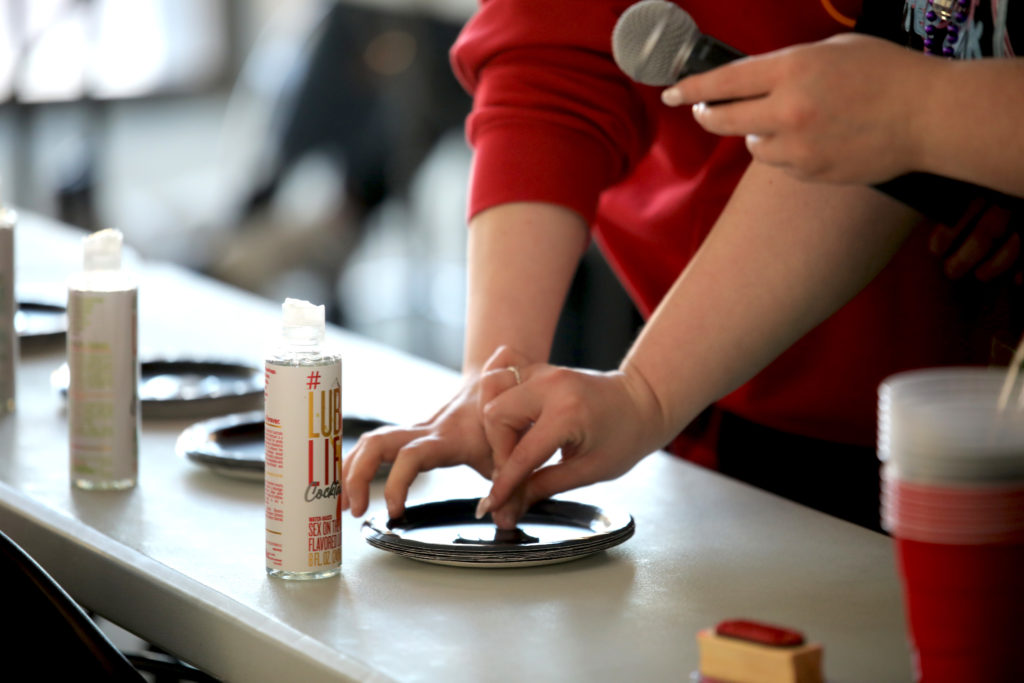Students receiving sex education keep college campuses safe, but are all students included in these discussions? Former Ball State University assistant director of Health Promotion and Advocacy Destiny Cherry defines sex education as inclusive and accessible health care and education to help people make the best decisions for themselves, their partners, and their bodies.
According to the Health Resources and Services Administration, 94% of college students are having sex. The social norms of students’ health-risk behaviors are influenced by family, peers, and the school environment, according to a study from the International Journal of Environmental Research and Public Health in the National Library of Medicine.
Cherry says that no sex is safe sex, but there are ways to have safer sex, including taking preventative measures against pregnancy and sexually transmitted infections (STIs).
Cherry also explains that there is pressure to be sexually active in college, and she thinks this pressure makes students feel like they need to do something earlier than they’re ready for.
She says that the pressure to have sex can also impact friendships, depending on the additional pressure to fit in with those around you.
Hookups and dating apps
Hookup culture has become more prevalent on college campuses. How one would define a hookup is different based on the person, but Cherry encourages the importance of communication and consent in these relationships.
“I do think that hookup culture could potentially impact mental health if we’re not having appropriate conversations,” Cherry says. “If there isn’t proper communication. It can be really hard to ask for what you need or to clarify what your relationship looks like, and I think that can be really tough.”
According to Pew Research Center, 53% of people under the age of 30 have used a dating app. This research also showed that only 28% of straight people have tried online dating, whereas 51% of LGBTQ+ people have.
Cherry says dating apps have changed the way many college students are meeting and have potentially altered how many students view relationships.
A study from the University of South Carolina looked at the differences in motivation on dating apps between men and women. They had two different categories for subjects to fall into: looking for “casual sex,” defined by the study as “sex without the expectation of a relationship after,” or “not casual sex.” In this group, 55% of women listed casual sex as a motivation while 80% of men did.
Cherry says that dating apps have changed the way people communicate.
“I think it is not as common for students to meet significant others or sexual partners in class or at bars,” she says. “Most students at some point in time, it seems like, have been on a dating app, are on a dating app, or multiple apps. There’s a lot of emphasis placed on how quickly you’re responding to people, how quickly you want to get together, and how many people you’re talking to.”
Ball State assistant director of the Office of Inclusive Excellence Brandon Million says dating apps are a danger for students, especially those that are a part of the LGBTQ+ community.
“The apps are horrible, and they lead to all kinds of issues,” Million says. “They lead to dangerous encounters, they lead to people doing stupid things. Sometimes it’s like, ‘Oh, why did you do that?’ Because they had no other place to go, and sometimes that’s where they’re learning their sex education from too.”
LGBTQ+ advocacy
Sex education is underprepared for anyone who is not heterosexual and cisgender, Million says.
“I know from firsthand experiences working with students that sex education doesn’t talk to the LGBTQ+ population,” he says.
Million says being a part of the LGBTQ+ community makes dating in college difficult. He says that lack of proper sex education for the community causes safety concerns.
“Especially in Muncie, there is no real place for LGBTQ+ students to go meet others,” he says. “We don’t have an LGBTQ+ center on campus, so there’s no real place to congregate there. If you’re not over 21, you can’t go to The Mark. So, we really don’t have a place for people to meet.”
Mark III Taproom is Indiana’s oldest LGBTQ+ nightclub, and it’s only open to those 21 and over.
Ball State has an LGBTQ+ support community called Spectrum. Spectrum is open to all LGBTQ+ students, as well as community allies. This group hosts campus events, such as Bingo After Dark, which is open to all students.

Freshman art education major Titus Hood describes Bingo After Dark as a bingo trivia event based around sex education questions. This event offers prizes surrounding sexual safety.
Ball Pride, Ball State’s LGBTQ+ affinity group, was founded by Million in 2019.This group is for Ball State faculty, staff, and graduate students.
Million says this group does not meet as much anymore, but they used to meet once a month.
In their meetings, they would discuss LGBTQ+ issues on campus. Million says they would strategize how they could make life better for the LGBTQ+ kids that came after them.
“We always tried to be something positive. That we talk about too, on top of the issues that we were facing at the time. It turned more into a place where we could come and feel like we could be ourselves,” Million says.
Titus says Ball State does not do enough to publicize its LGBTQ+ events and groups, and there should be more available.
“Things aren’t always the safest for people in the LGBTQ+ community,” Titus says. “Most people don’t want to go anywhere if they don’t feel safe. There’s not that guarantee of safety, like a safe space.”
Million says that shame is a common feeling for LGBTQ+ students after a sexual encounter. He says that now that stigma around the LGBTQ+ community has improved, it has helped ease fear of commitment among students.
“So many people get tangled up on titles,” he says. “It’s perfectly natural for people to go explore.”
Choosing abstinence
Abstinence is the choice to not participate in sex or any sexual activities. Abstinence is different from celibacy. Celibacy is a long-term choice to not have sex that is often due to religious promises. While celibacy can be a life-long commitment to refrain from sexual activity, abstinence is often temporary.
Abstinence may seem like an uncommon choice to the average college student, but it is normal to not be sexually active in college. According to a study done by the University of Georgia Health Center, 35% of undergraduate students reported having no sexual partners within the past year.

How sex education is taught differs drastically across institutions. According to research done by KFF, there are two main approaches toward sex education: abstinence-only and comprehensive sex education.
These categories are broad, but generally, abstinence-only programs teach that abstinence from sex is the only morally acceptable option for youth, as well as the only safe and effective way to prevent unintended pregnancy and STIs. They typically do not discuss contraceptive methods or condoms.
Comprehensive sex education generally includes medically accurate, evidence-based, and age-appropriate information about sexuality, sexual and reproductive health, consent, contraceptives, pregnancy, and STIs.
Abstinence-only education has remained a controversial topic, as it does not provide sexual and reproductive health information that is LGBTQ+ inclusive. The Guttmacher Institute states that this information is necessary for adolescents, so they can make informed decisions about their sexual behavior, relationships, and reproductive choices.
Cherry noted that abstinence is the only 100% way to prevent pregnancy and STIs. She says the pressure to have sex in college could potentially impact dating and relationships if a student chooses abstinence. However, she stresses that students need to make the best decision for themselves, their partners, and their bodies.
Understanding your own body
Understanding and appreciating yourself and your body are key factors to having healthy relationships, as well as a healthy sex life, according to the Mayo Clinic.
Some people experience negative feelings about their bodies and become self-conscious during sexual activity. This can lead to avoiding sexual activity, an impaired ability to experience arousal and achieve orgasm, and an unwillingness to advocate for yourself when sexual activity becomes painful or uncomfortable.
In order to feel more comfortable, Cherry recommends students explore their own bodies. She says students should practice asking for what they want and need, asking any questions they have, and looking up any desired information.
“One of the things that I recommend is doing a mirror exercise. Stand in front of a mirror, look at yourself, and see if you can spend however much time you can not picking apart things that you don’t like about yourself, but thinking about things that you do like and things that you appreciate about yourself,” she says.
Cherry says taking care of yourself is the most important aspect of a healthy sex life and stresses that students should do only whatever makes them feel comfortable.
Ball State University resources

Ball State works toward providing students with substantial access to safer sex resources and supplies.
“We are very lucky that we can provide free safer sex resources for students,” Cherry says. “Some institutions can’t, but we put an emphasis on providing that.”
Different items are available in the health center, Multicultural Center, and Counseling Center
in order to make the resources accessible in different spaces around campus.
Cherry says Ball State also works with the county health department to provide free STI and HIV testing to students year round.
Ball State previously had a space named the Women’s Center, which Cherry says was recently renamed as a Sexual Health Resource Area. This space offers gynecological exams, UTI testing, yeast infection testing, and urine pregnancy tests. Here, students can also talk about relationships — physical and emotional — with faculty.
She says the health department offers multiple presentations a year, ranging from 10 minutes to an hour long, about general sex education. These have and could in the future include topics such as contraception, hormonal methods, different sex products, STIs, and STDs.
Sex education is important for the health and safety of college students in many different ways. Keeping campuses welcoming and informed allows for a comfortable environment for everyone.
“I think that you know yourself better than anyone else does and ever will, and I think if you don’t want to date, don’t date. If you don’t want to have sex, don’t have sex. If you want to try something out, get consent from a partner and try it out,” Cherry says. “I think there’s a lot of pressure around what’s considered normal, and I would say with sex and relationships that there really isn’t a normal. It’s what you feel like is best for you.”
Sources: KFF, Health Resources and Services Administration, International Journal of Environmental Research and Public Health, Gitnux, Pew Research Center, University of South Carolina, DWNTWN Muncie, Planned Parenthood, Cambridge Dictionary, University of Georgia, Guttmacher Institute, World Health Organization, Mayo Clinic




